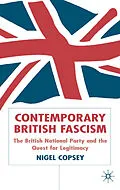For the first time since the 1970s when the National Front became Britain's fourth largest political party, the recent electoral success of the British National Party has put Britain's extreme right back on the political map. Nigel Copsey provides a clear and comprehensive analysis of the history of the British National Party and its struggle for political legitimacy. With far-right parties enjoying unprecedented success across Europe, this book also locates its subject in the broader international context.
Autorentext
NIGEL COPSEY is Senior Lecturer in History at the University of Teesside. The author of Anti-Fascism in Britain, he has published widely on British right-wing extremism, fascism and anti-fascism.
Zusammenfassung
No other political party in the history of Britain's fascist tradition has been as successful at the ballot box as today's British National Party (BNP). It has won increasing success at local elections and now threatens to follow the wider European trend and break through into the national arena of mainstream politics. Contemporary British Fascism offers the first in-depth study of the BNP and its quest for social and political legitimacy. Founded in 1982 and led by John Tyndall until 1999, the 'old' BNP is thoroughly investigated. Nigel Copsey then moves on to discuss Nick Griffin's 'modernization' strategy as well as the factors behind the party's recent electoral success. In the final chapter, the subject is placed in its wider European context. This is a thought-provoking book that serves as a wake-up call for those who take the party's growing respectability at face value.
Inhalt
Introduction 'Back to Front': John Tyndall and the Origins of the British National Party The Struggle for the Soul of British Nationalism A False Dawn in Tower Hamlets: The British National Party in the 1990s Fascism on the Fringe: The Ideology of Tyndall's British National Party New Millennium, New Leader: Nick Griffin and the Modernization of the British National Party Into the Political Mainstream? The 2001 General Election and After The British National Party in Comparative Context Conclusion Select Bibliography Index
